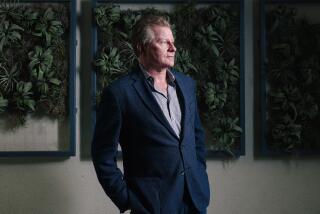BOOK REVIEW / FICTION : An Eloquent and Sensuous Telling of an Age-Old Tale : THE VERY MODEL OF A MAN <i> by Howard Jacobson</i> ; Overlook Press $22.95, 352 pages
- Share via
The Sunday school story of Cain and Abel, the world’s very first case of sibling rivalry, becomes something rich and strange in the hands of British novelist Howard Jacobson, whose latest book is a triumphant example of how a gifted storyteller can breathe new life into some of the most familiar passages of the Bible.
Rather like a mystery story where the crime is revealed at the very outset, the tale of Cain and Abel poses a challenge to a contemporary author who is audacious enough to retell it; after all, we all know how the story turns out before we even pick up the book. But Jacobson rises to the challenge in “The Very Model of a Man” by taking us to a richly imagined time and place somewhere east of Eden--a dream-time in which God, angels, men and women are constantly banging into each other--and surprising us, again and again.
“The Very Model of a Man” can be approached as an account of Creation’s ultimate dysfunctional family, and Jacobson expertly charts the psychological fault lines that run through all of the patriarchs and matriarchs of Genesis and Exodus. Cain is deeply aggrieved at his fathers, both human and divine, and dangerously frustrated at his mother’s apparent preference for his baby brother, but he is hardly the only member of his family with a bad attitude and a propensity for acting out.
“The entire architecture of our commonweal had been shaken and defaced to an extent that made a mockery of the paltry arithmetical difference between three and four,” says Cain about the birth of Abel.
But Jacobson’s real achievement in “The Very Model of a Man” is his celebration (and, indeed, sanctification) of language as an instrument of survival and redemption. Cain is presented as an itinerant storyteller whose restless wanderings bring him to the city of Babel, a metropolis where storytelling is not merely a form of public entertainment but a kind of public worship.
“Babel was . . . ultimately the centre of every story, the haven to which all exiles dreamed of returning, the goal of every traveler, the reward for every virtue, the pattern for every striving, the paradise by whose loss every sinner calculated his deprivation and every criminal his fall,” writes Jacobson.
So “The Very Model of a Man” is fashioned out of a series of monologues that Cain delivers to the audiences of Babel, speaking out loud the terrible truths that he has discovered, the terrible deeds that he has seen and done, all in a desperate effort to explain and thereby save himself.
“I hold my brother Abel so still in my mind . . . that he is more present to me as the small collection of phonetic sounds his name makes--two little vowels, a labial, a liquid--than as a thing of moving parts,” confesses Cain. “Was there a time, before he had become a rack of letters to me, when I grasped him as blood that flowed and bones that could be snapped?”
At moments, the wordplay in Jacobson’s novel is so dense, so complex, and yet so subtle, that we are forced to slow down in order to make our way through the thickets of language. Jacobson himself picks up words as if they were gemstones, turns them over in the light, peers deeply into their inner structure and shows us how they sparkle.
And yet “The Very Model of a Man” is not a dry and papery book. Quite to the contrary, the thoughts and experiences that Jacobson manages to invoke are so lush, so opulent, so abundant in sensual pleasure, that the book is truly a sensuous experience--our senses are sometimes pricked, sometimes pampered, but we are always pumped along by Jacobson’s throbbing prose.
Then, too, the author finds sly and sometimes bawdy humor in the impossibly convoluted human (and divine) relationships that he ponders. The transcendent love triangle--Adam and Eve and the Almighty, who is known variously as “the Jealous Potter,” “the Mirthless One,” “the One True Voice-Thrower”--becomes the stuff of a bedroom comedy. Adam, for example, frets over Eve’s entanglements with God, and wonders out loud “what she sees in Him since He can’t be seen.”
When Jacobson indulges his taste for ribaldry, sensuality and broad humor, his book reminds me of Joseph Heller’s “God Knows,” where the narrator is King David in the guise of a Yiddish vaudevillian. But “The Very Model of a Man” owes something more to Michel Tournier’s retelling of the Nativity, “The Four Wise Men,” where one of the simplest Bible stories is cracked open like a geode to reveal a crystalline world of fabulous complexity.
Still, we do not really need any reference points to fix Jacobson’s position in the literary firmament--he is a strange new star, and he has created something truly remarkable out of the found objects of biblical narrative, existential philosophy and contemporary psychology. And, above all, the sheer pleasure of reading “The Very Model of a Man” is its own ample reward.
More to Read
Sign up for our Book Club newsletter
Get the latest news, events and more from the Los Angeles Times Book Club, and help us get L.A. reading and talking.
You may occasionally receive promotional content from the Los Angeles Times.









